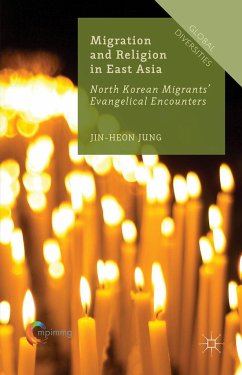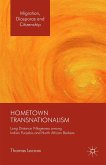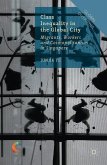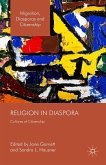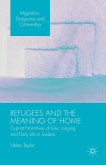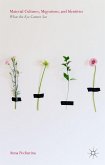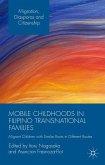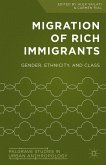This book sheds light on North Korean migrants' Christian encounters and conversions throughout the process of migration and settlement. Focusing on churches as primary contact zones, it highlights the ways in which the migrants and their evangelical counterparts both draw on and contest each others' envisioning of a reunified Christianized Korea.
"This absorbing study, unparalleled in modern migration studies, is based on long-term ethnographic fieldwork in South Korea and Chinese-North Korean borderlands, and on North Korean migrants' narratives of Christian conversion. Brilliantly described is how, while repression and poverty drive defection, Christianity provides aspirations and the promise of church welfare in South Korea." - David Parkin, University of Oxford, UK
"Migration and Religion in East Asia is a sensitive ethnography of the complex relations between North Korean migrant-refugees and South Korean Protestant Christians. Drawing on more than a decade of fieldwork involving missionary churches in northern China and a Pentecostal 'Freedom School' in Seoul, Jin-Heon Jung shows how North Korean migrant-refugees learn to locate themselves within a Cold War, evangelical, ethnonational soteriology by converting to Christianity and equating capitalist freedom with a new doctrine of individual "self-reliance." - Nicholas Harkness, Harvard University, USA
"In this book, Jin-Heon Jung explores interactions between North Korean migrants and South Korean Evangelicals [...]. This is a set of topics that have been woefully understudied; for taking them on, the author deserves our applause." - Timothy S. Lee, Texas Christian University, USA
"Jung has given us a fascinating account of how human life trajectories are constituted by conversion from Communism to Christianity in the dangerous move from North Korea to South Korea. This book brings us close to lived experience within the changing context of North-South relations in Korea. It highlights the politics of Christianity as well as the aftermath of the Korean War and is thus a must read for anyone interested in Asia, religion, and international relations." - Peter van der Veer, Max Planck Institute for the Study of Religious & Ethnic Diversity, Germany
"Migration and Religion in East Asia is a sensitive ethnography of the complex relations between North Korean migrant-refugees and South Korean Protestant Christians. Drawing on more than a decade of fieldwork involving missionary churches in northern China and a Pentecostal 'Freedom School' in Seoul, Jin-Heon Jung shows how North Korean migrant-refugees learn to locate themselves within a Cold War, evangelical, ethnonational soteriology by converting to Christianity and equating capitalist freedom with a new doctrine of individual "self-reliance." - Nicholas Harkness, Harvard University, USA
"In this book, Jin-Heon Jung explores interactions between North Korean migrants and South Korean Evangelicals [...]. This is a set of topics that have been woefully understudied; for taking them on, the author deserves our applause." - Timothy S. Lee, Texas Christian University, USA
"Jung has given us a fascinating account of how human life trajectories are constituted by conversion from Communism to Christianity in the dangerous move from North Korea to South Korea. This book brings us close to lived experience within the changing context of North-South relations in Korea. It highlights the politics of Christianity as well as the aftermath of the Korean War and is thus a must read for anyone interested in Asia, religion, and international relations." - Peter van der Veer, Max Planck Institute for the Study of Religious & Ethnic Diversity, Germany

